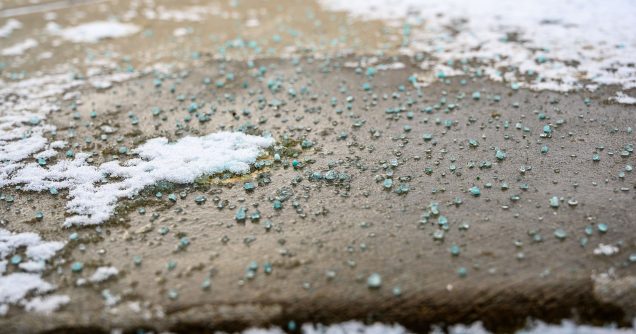Snow, ice, and frigid temperatures are just around the corner here in New England. That means you must make sure your well system is ready for winter weather. The best way to do so is to receive a thorough, professional-grade inspection from Greco & Haines — your go-to company for best-in-class well water service in Woodbridge, Derby, Shelton, and all over Connecticut. We offer the services you need to keep your pipes from freezing, along with other winter well maintenance tips.
One of the largest issues that private well owners need to be aware of is road salt.
More than 20 million tons of salt are applied on roads, parking lots, walkways, and other pavement in the U.S. every year for de-icing purposes. What makes this an issue is that this road salt can seep into groundwater — and, thereby, well water.
That is why it’s important to understand the direct impacts of road salt in well water, how to prevent well water contamination, and solutions for identifying and mitigating an excessively salt-infiltrated water supply. Before you need to lace up those winter boots and break out the snow shovel, Greco & Haines is going to help you prepare for the season.
How Road Salt Can Affect the Quality of Your Water in Winter
Road salt flows into soil and aquifers when it’s washed off road surfaces to shoulders, embankments, and ditches. This movement happens from runoff, meltwater, or when it seeps from plowed-up roadside snowbanks or salt-storage barns. Flooding associated with rapid snowmelt or an early-spring storm can also transport road salt; though, the sodium chloride is likely to be entirely diluted by that stage.
Once absorbed underground, road salt may take months to work its way into an aquifer and potentially your well water supply. Road salt in drinking water, and well water in general, can be an undesirable issue for many reasons. High sodium levels may pose a problem for dietary intake, as it can lead to conditions such as hypertension or exceed recommended amounts for individuals following low-sodium diets.
Chloride agents, such as calcium chloride added to improve de-icing at colder temperatures, can also lead to harmful issues. Having chloride in your well water can be bad for your house or yard plants, cause an off-flavor, and spur leaching of lead and copper from plumbing.
Tips on How to Prevent Road Salt from Getting into Your Water System
An adequately deep drilled well with long casing in good condition reduces the chances of road-salt infiltration. A well placed far enough away from a roadway or one of the storage barns used by transportation agencies to stockpile road salt will, too. Making sure the ground slopes away from your wellhead is another preventive method, as this averts the pooling of runoff that can concentrate salty water around your well.
How to Tell If Your Water is Contaminated with Road Salt
Regular testing of your water supply is the best way to determine whether you have high sodium or chloride levels, which may indicate an issue with road salt. There are other reasons you may have elevated concentrations of these elements, emphasizing the importance of repeated water-quality tests. If you have year-round issues, that may point to another cause. However, a seasonal spike tends to point to contamination of road salts from de-iced roads or storage sheds.
Here at Greco & Haines, we offer many well water services along with water-quality tests that can help you assess whether your drinking water’s compromised by road salt. This check not only gauges sodium and chloride levels, but also screens for signs of leached minerals from corroded pipes.
How to Remedy Road Salt Issues in Your Water Supply
Water-quality testing and thorough inspections of your well system can help evaluate if you have a road-salt problem and craft a strategy to remedy it. You may need to repair or replace your well water pump, casing, pipes, or other components. Regrading around your wellhead may be effective, too. In some cases, an improperly sited well too close to a source of contamination will need to be replaced with an installation at a different location. Meanwhile, our full home water filtration systems can help easily remove sodium and chloride from your water supply.
Get Ready for Winter with Help from Greco & Haines
Turn to Greco & Haines to help identify if your well water is contaminated with road salt and to tackle the issue head-on. Schedule a site assessment with our team for a well inspection, water-quality testing, or, of course, any well system repairs and upgrades. You can contact us on our website or call any time! 203-735-9308 or 203-777-2256 or Call Toll-Free from any CT Area Code 1-800-922-2958

